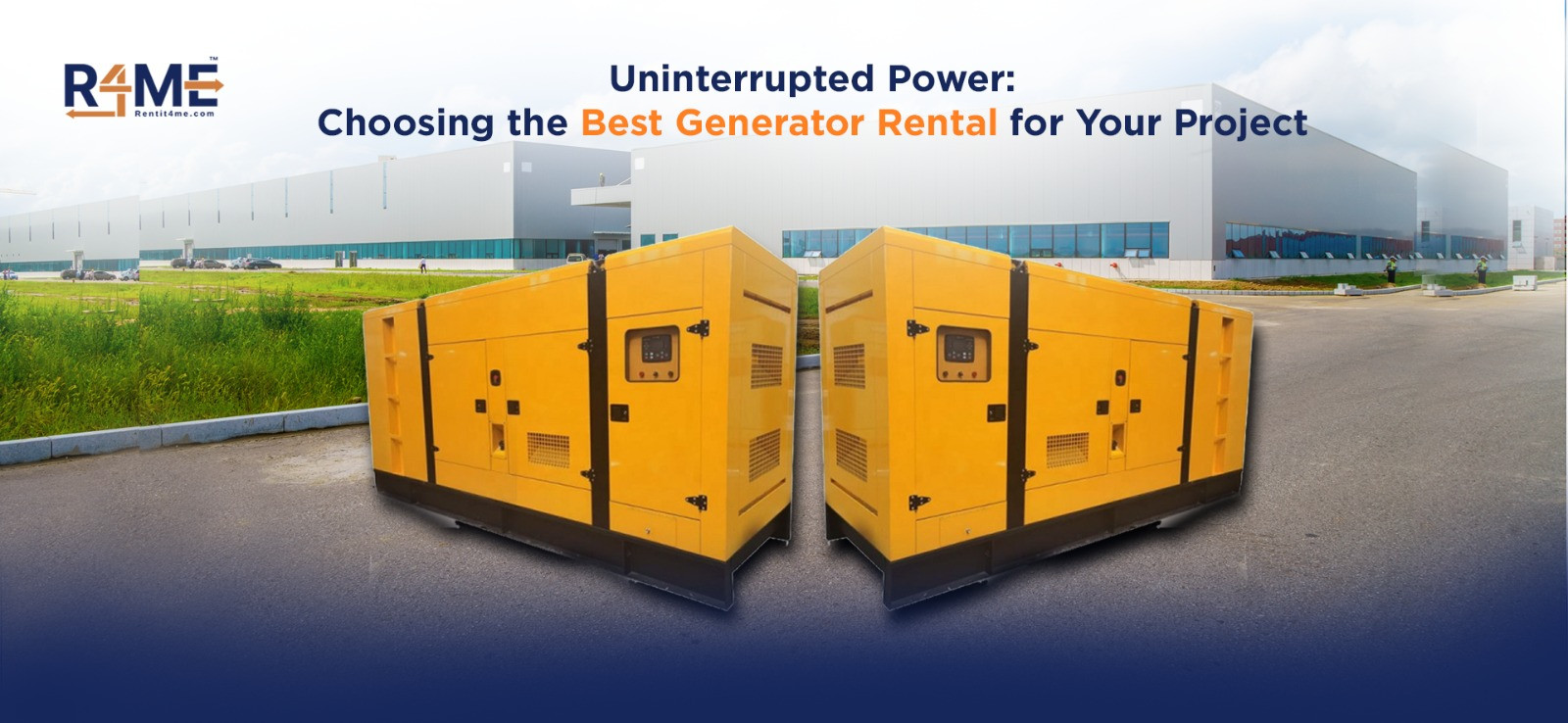

In the realm of construction, events, and outdoor projects, the consistent flow of power is not just a convenience but often a necessity. Generators step in as the unsung heroes, maintaining smooth operations when traditional power sources are out of reach. From bustling construction sites to remote locations where electricity grids dare not tread, generators are the backbone of modern project management. Whether it's powering heavy machinery, lighting up event spaces, or ensuring vital equipment remains operational, the versatility of generators knows no bounds. In this guide, we delve into the world of generator rentals, exploring the best options tailored to different project sites and needs. Renting a generator offers a cost-effective, flexible solution without the burdens of upfront investment, maintenance costs, and storage concerns associated with ownership.
Generator rentals offer a diverse range of options tailored to suit various tasks and project requirements. From compact portable units for small-scale events to robust industrial generators capable of powering large construction sites, the rental market provides flexibility and scalability. However, opting to rent diesel generators instead of purchasing them outright offers several distinct advantages:
• Cost-Effectiveness: Renting eliminates the need for a significant upfront investment, making it a budget-friendly solution, especially for projects with financial constraints.
• Maintenance: Rental agreements often include maintenance and servicing, relieving users of the responsibility and cost of upkeep and repairs.
• Access to Latest Technology: Renting provides access to the latest models and technologies without the commitment of ownership, ensuring projects benefit from efficient and reliable equipment.
• No Storage or Resale Concerns: After project completion, there are no worries about storage or resale, as the generator can simply be returned to the rental provider.
Determining the most suitable generator for rental is contingent upon your unique power demands, the setting where it will be utilized, and the specific equipment it will support. Whether you're organizing an outdoor event, managing operations in a factory, or ensuring uninterrupted power for a hospital or hotel, it's essential to consider the nuances of the setting and the equipment's power requirements.
For instance, an outdoor event with lighting and sound equipment may require a portable generator with sufficient wattage, while a factory with heavy machinery might necessitate a larger industrial generator. By carefully evaluating these factors and considering specific examples like these, you can select a generator type that precisely matches your needs and ensures seamless power delivery.
1. Power Requirements: Determine the total power consumption of all equipment and machinery that will be connected to the generator. This includes considering both the starting power requirements (surge power) and the continuous power needs. Ensure that the generator's capacity matches or exceeds the total power requirements of your project.
2. Fuel Type and Availability: Consider the fuel type that best suits your project's needs, whether it's diesel, gasoline, propane, or natural gas. Additionally, assess the availability of the chosen fuel type in the project location to ensure uninterrupted operation throughout the project duration.
3. Portability and Mobility: Evaluate the mobility requirements of your project site. For remote or mobile projects, portable generators may be preferred for their ease of transportation and flexibility. Conversely, for stationary projects, larger stationary generators may be more suitable.
4. Noise Level: Depending on the project site and surrounding environment, noise level regulations or considerations may be crucial. Select a generator with a noise level that complies with local regulations and minimizes disruption to nearby residents or workers.
5. Emissions and Environmental Impact: Assess the environmental impact of the generator, particularly in sensitive or regulated areas. Choose generators that meet emission standards and prioritize fuel-efficient models to reduce carbon footprint and minimize environmental impact.
6. Budget and Cost: Consider the upfront cost of renting or purchasing the generator, as well as any ongoing maintenance or fuel expenses. Balance the initial investment with long-term operational costs to determine the most cost-effective solution for your project.
By carefully evaluating these key points and selecting a generator that aligns with your project's specific requirements, you can ensure reliable power supply, optimal performance & efficiency and seamless operation throughout the duration of your project.
Once you've assessed your project site's needs and the power requirements of your tools and equipment, choosing the right generator becomes straightforward. Rentit4me offers various types of generators suited to specific needs, each serving distinct purposes. From backup generators to portable and industrial generators, and even battery rental and hybrid designs, our selection encompasses diverse options tailored to different project requirements. Here's an overview of the types of generators we offer:
1. Backup Generators: Generators designed for supplemental and emergency power fall under this category. Power outages at job sites can halt work, impacting performance, efficiency, and safety. Emergency generators restore electricity immediately during such outages, although they typically have shorter running times compared to industrial applications.
2. Portable Generators: Popular for events, homeowners and construction projects, portable generators are ideal for mobile work. Easily transported on truck beds or even by hand, these generators are advantageous in restricted or limited workspaces. However, they also have limited running times and power output.
3. Industrial Generators: This category encompasses a broad range of generators used for emergency backup power in various settings. Industrial generators for construction sites often feature trailer hook-ups for easy transportation. They offer dependable, stable power suitable for extensive power surges and are available in various fuel options like natural gas, diesel, gasoline, and hybrid systems.
4. Hybrid Generators: Hybrid power systems, utilizing lithium power and battery designs, represent an innovative solution for on-demand power needs. These systems, increasingly popular for construction and other applications, offer flexibility and efficiency, bridging the gap between traditional generators and emerging technologies.
Booking a rental silent generator with Rentit4me is straightforward. Connect with our team via mail, chat, call, enquiry form on our website and submit your requirements. Based on your requirements, our team will guide you with the best options. Upon completion of KYC and payment, the generator shall be delivered to your project location.
In conclusion, selecting the right generator rental for your project is essential for ensuring uninterrupted power supply and efficient operations. By considering factors such as power requirements, fuel type, portability, noise level, emissions, and budget, you can make an informed decision that meets your project's specific needs. Rentit4me offers various generator options tailored to various project requirements, providing cost-effective and flexible solutions. Connect with our team today to find the perfect generator for your project needs and enjoy seamless power delivery throughout your project duration.